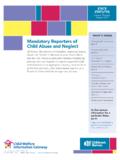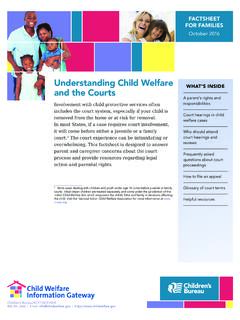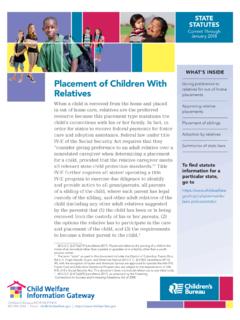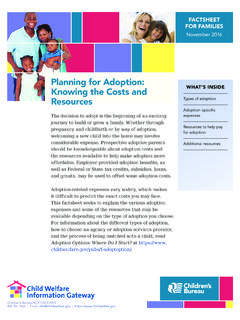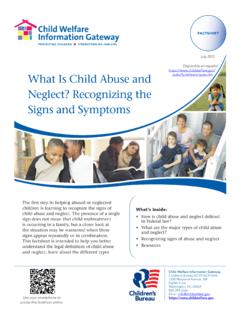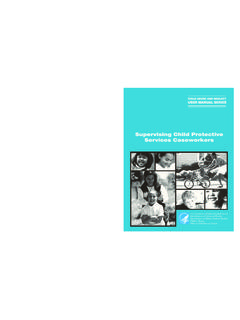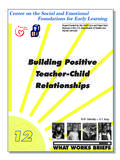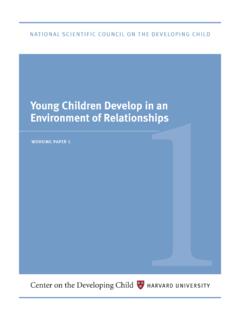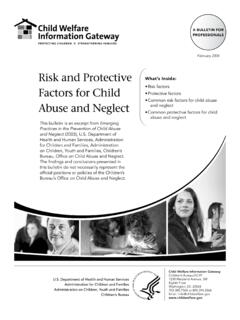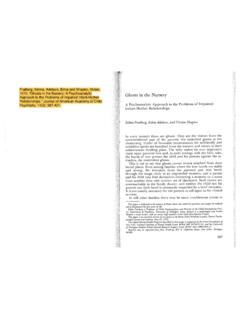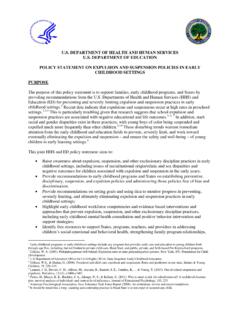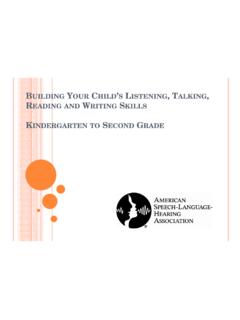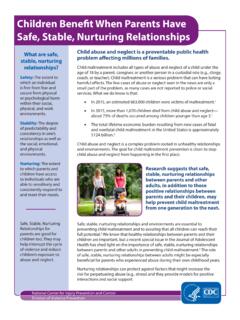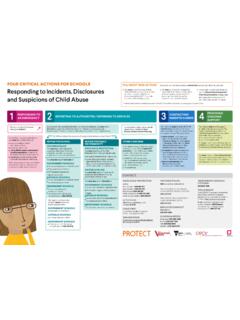Transcription of Determining the Best Interests of the Child - Child Welfare
1 Children s Bureau/ACYF/ | Email: | STATUTESC urrent Through March 2016 Determining the best Interests of the Child WHAT S INSIDEBest Interests definitionGuiding principles of best Interests determinationsBest Interests factorsOther considerationsFull-text excerpts of State lawsTo find statute information for a particular State, go to make a variety of decisions that affect children, including placement and custody determinations, safety and permanency planning, and proceedings for termination of parental rights. Whenever a court makes such a determination, it must weigh whether its decision will be in the best Interests of the States, the District of Columbia, American Samoa, Guam, the Northern Mariana Islands, Puerto Rico, and the Virgin Islands have statutes requiring that the Child s best Interests be considered whenever specified types of decisions are made regarding a Child s custody, placement, or other critical life t ThrouhguMrha rueuMrMhc2hrouh0ot16h2 This material may be freely reproduced and distributed.
2 However, when doing so, please credit Child Welfare Information Gateway. This publication is available online at Interests DefinitionAlthough there is no standard definition of best Interests of the Child , the term generally refers to the deliberation that courts undertake when deciding what type of services, actions, and orders will best serve a Child as well as who is best suited to take care of a Child . best Interests determinations are generally made by considering a number of factors related to the Child s circumstances and the parent or caregiver s circumstances and capacity to parent, with the Child s ultimate safety and well-being the paramount Principles of best Interests DeterminationsState statutes frequently reference overarching goals, purposes, and objectives that shape the analysis in making best Interests determinations. The following are among the most frequently stated guiding principles: The importance of family integrity and preference for avoiding removal of the Child from his/her home (approximately 28 States, American Samoa, Guam, Puerto Rico, and the Virgin Islands)11 In Alabama, Alaska, California, Colorado, Georgia, Hawaii, Idaho, Indiana, Kansas, Maine, Mississippi, Missouri, Montana, Nebraska, New Jersey, New Hampshire, New Mexico, New York, North Carolina, North Dakota, Oklahoma, Pennsylvania, Rhode Island, South Carolina, Utah, Washington, West Virginia, and Wyoming.
3 The word approximately is used to stress the fact that States frequently amend their laws. This information is current as of March 2016. The health, safety, and/or protection of the Child (21 States and the Northern Mariana Islands)22 In Arizona, Arkansas, Colorado, Georgia, Hawaii, Idaho, Illinois, Kansas, Louisiana, Massachusetts, Nebraska, New Hampshire, New Jersey, New Mexico, North Carolina, Oklahoma, Pennsylvania, Utah, Washington, West Virginia, and Wyoming. The importance of timely permanency decisions (19 States and the Virgin Islands)33 In Alabama, Alaska, California, Hawaii, Idaho, Iowa, Kansas, Louisiana, Maine, Nebraska, New Mexico, New York, North Carolina, Oklahoma, South Carolina, Texas, Vermont, Washington, and West Virginia. The assurance that a Child removed from his/her home will be given care, treatment, and guidance that will assist the Child in developing into a self-sufficient adult (12 States, American Samoa, and Guam)44 In Alabama, Colorado, Georgia, Hawaii, Idaho, Kansas, Mississippi, Oklahoma, Pennsylvania, Rhode Island, South Carolina, and West Interests FactorsApproximately 22 States and the District of Columbia list in their statutes specific factors for courts to consider in making determinations regarding the best Interests of the Connecticut, Delaware, Florida, Georgia, Hawaii, Illinois, Kansas, Kentucky, Maine, Maryland, Massachusetts, Michigan, Nevada, North Dakota, Ohio, Oregon, South Dakota, Tennessee, Texas, Vermont, Virginia, and Wisconsin.
4 While the factors vary considerably from State to State, some factors commonly required include: The emotional ties and relationships between the Child and his or her parents, siblings, family and household members, or other caregivers (15 States and the District of Columbia)66 Connecticut, Delaware, Florida, Hawaii, Illinois, Kansas, Maryland, Massachusetts, Michigan, North Dakota, Ohio, Oregon, Tennessee, Vermont, and Virginia. The capacity of the parents to provide a safe home and adequate food, clothing, and medical care (10 States)77 Florida, Georgia, Hawaii, Illinois, Maryland, Michigan, North Dakota, Texas, Vermont, and Wisconsin. The mental and physical health needs of the Child (nine States and the District of Columbia)88 Connecticut, Delaware, Florida, Georgia, Kansas, Maine, Michigan, Nevada, and Virginia. The mental and physical health of the parents (nine States and the District of Columbia)99 Delaware, Georgia, Kentucky, Michigan, North Dakota, South Dakota, Tennessee, Texas, and Virginia.
5 The presence of domestic violence in the home (nine States)1010 Delaware, Georgia, Kentucky, Michigan, North Dakota, Oregon, Tennessee, Texas, and eight of these States and the District of Columbia, all the factors listed in the statute must be Georgia, Illinois, Maine, Maryland, Michigan, Oregon, Vermont, and Virginia. For example, Illinois law provides a list of the factors that, within the context of the Child s age and developmental needs, shall be considered in Determining best Interests . Similarly, the District of Columbia requires that courts consider each factor listed in its best Interests statute in making such decisions. In the remaining 14 States whose statutes list best Interests factors, courts making best Interests determinations are directed to consider all relevant factors, not only those specifically listed in the Connecticut, Delaware, Florida, Hawaii, Kansas, Kentucky, Massachusetts, Nevada, North Dakota, Ohio, South Dakota, Tennessee, Texas, and t ThrouhguMrha rueuMrMhc2hrouh0ot16h3 This material may be freely reproduced and distributed.
6 However, when doing so, please credit Child Welfare Information Gateway. This publication is available online at States also list factor(s) that should not be considered in the best Interests analysis. For example, Connecticut law states that the determination of the best Interests of the Child shall not be based on the consideration of the socioeconomic status of the birth parent or caregiver. Delaware prohibits courts from assuming that one parent, because of his or her sex, is better qualified than the other parent to act as a custodian or primary residential parent. Idaho does not permit discrimination on the basis of a parent s in the remaining 28 States, American Samoa, Guam, the Northern Mariana Islands, Puerto Rico, and the Virgin Islands provide more general guidance and give more discretion to the courts to make best Interests In Alabama, Alaska, Arizona, Arkansas, California, Colorado, Idaho, Indiana, Iowa, Louisiana, Minnesota, Mississippi, Missouri, Montana, Nebraska, New Hampshire, New Jersey, New Mexico, New York, North Carolina, Oklahoma, Pennsylvania, Rhode Island, South Carolina, Utah, Washington, West Virginia, and Wyoming.
7 Under Alabama law, for example, courts are provided with a set of goals to facilitate the care, protection, and discipline of children who come within their jurisdiction. In California and Iowa, a best Interests determination for Indian children must include steps to maintain Tribal relationships and preserve the Child s unique Tribal culture and values. When out-of-home care is needed, the Child must be placed, whenever possible, with a family that can help the Child maintain these connections, as required by the Federal Indian Child Welfare Act ( 95-608).Other ConsiderationsOther factors that courts commonly take into consideration in making best Interests determinations include the following: Federal and/or State constitution example, New Hampshire law provides that its processes related to reports of Child abuse or neglect are to be carried out within a judicial framework that recognizes and enforces the constitutional and other rights of the parties involved.
8 Pennsylvania s statute states that it shall be interpreted so as to provide a means through which parties are afforded a fair hearing and assured the recognition of their constitutional and legal Other States that address the issue of parent and/or Child rights within their best Interests statutes include Georgia, Missouri, Montana, Nevada, New Mexico, New York, North Carolina, Oklahoma, South Dakota, Tennessee, Utah, Washington, West Virginia, and Puerto Rico. The importance of maintaining sibling and other close family bonds. For example, Alaska law notes the importance of frequent, regular, and reasonable visitation with parents and family members when a Child has been removed from the home. Florida considers the love, affection, and other emotional ties between the Child and his or her parents, siblings, and other relatives to be important in Determining the manifest Interests of the Other States that address the importance of maintaining family and sibling relationships include California, Colorado, Connecticut, Georgia, Hawaii, Illinois, Kansas, Maryland, Minnesota, Missouri, Montana, New Hampshire, Ohio, Oklahoma, Oregon, Pennsylvania, Vermont, Virginia, West Virginia, and Wisconsin, as well at the District of Columbia and the Virgin Islands.
9 The Child s wishes. Approximately 12 States and the District of Columbia require courts to consider the Child s wishes when making a determination of best Delaware, Florida, Georgia, Illinois, Maine (when the Child is age 12 or older), Massachusetts (when the Child is age 12 or older), Michigan, North Dakota, Ohio, Rhode Island, Virginia, and Wisconsin. In making this determination, the court will consider whether the Child is of an age and level of maturity to express a reasonable preference. This publication is a product of the State Statutes Series prepared by Child Welfare Information Gateway. While every attempt has been made to be as complete as possible, additional information on these topics may be in other sections of a State s code as well as agency regulations, case law, and informal practices and Citation: Child Welfare Information Gateway. (2016). Determining the best Interests of the Child . Washington, DC: Department of Health and Human Services, Children s t ThrouhguMrha rueuMrMhc2hrouh0ot16h4 This material may be freely reproduced and distributed.
10 However, when doing so, please credit Child Welfare Information Gateway. This publication is available online at Code 12-15-101 The purpose of this chapter is to facilitate the care, protection, and discipline of children who come within the jurisdiction of the juvenile court, while acknowledging the responsibility of the juvenile court to preserve the public peace and security. In furtherance of this purpose, the following goals have been established for the juvenile court: To preserve and strengthen the Child 's family whenever possible, including improvement of home environment To remove the Child from the custody of his or her parents only when it is judicially determined to be in his or her best Interests or for the safety and protection of the public To reunite a Child with his or her parents as quickly and as safely as possible when the Child has been removed from the custody of his or her parents unless reunification is judicially determined not to be in the best Interests of the Child To secure for any Child removed from parental custody the necessary treatment, care, guidance, and discipline to assist him or her in becoming a responsible, productive member of society To promote a continuum of services for children and their families from prevention to aftercare, considering wherever possible, prevention, diversion.
